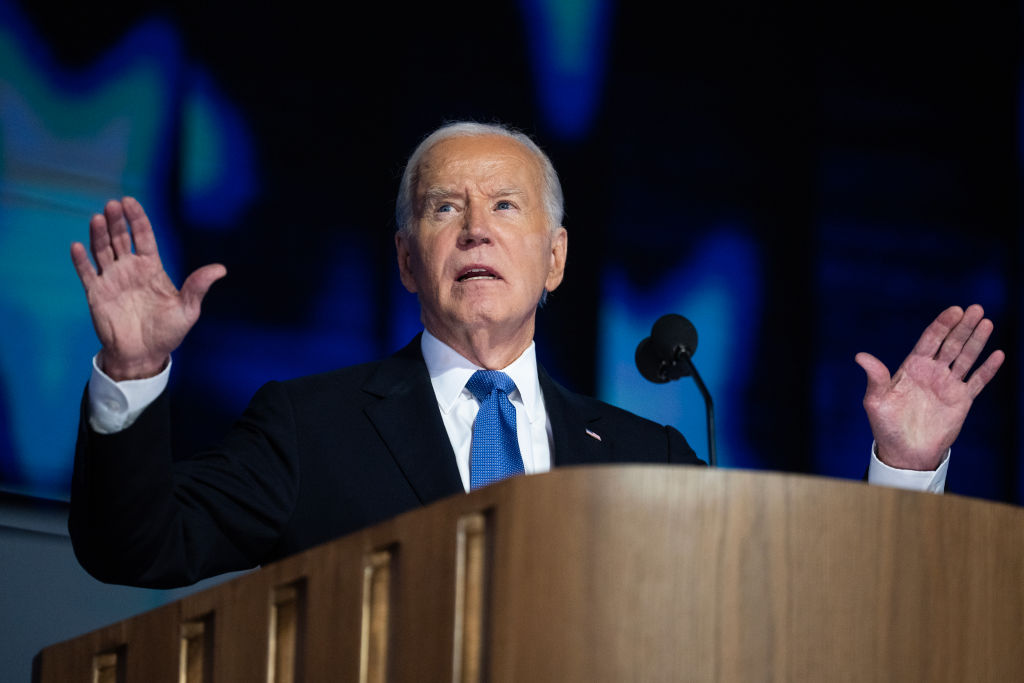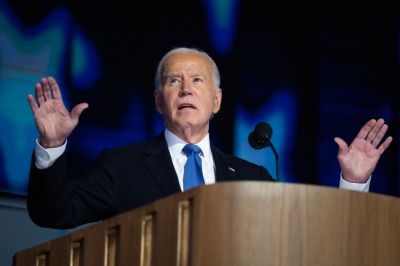President Joe Biden addressed the Democratic National Convention on Monday, delivering a 45-minute speech in which he championed several accomplishments from his time in office. He also made several false claims on issues such as economics, education, gun violence, and migration.
Jobs created during the Biden administration.
Biden touted the economic recovery that has taken place during his time in office. “We’ve gone from economic crisis to the strongest economy in the entire world,” Biden said. “[A] record 16 million new jobs.”
This claim is missing critical context. While Federal Reserve economic data shows that the U.S. economy has added 15.81 million non-farm jobs since January 2021, the country was still reeling from unprecedented pandemic-induced job losses when Biden entered office. As the Dispatch Fact Check noted in late June,
Biden’s employment growth numbers benefit from the fact that he took over as president when employment was in a deep but temporary valley. The Bureau of Labor Statistics calculated that the economy lost 21.4 million jobs in March and April of 2020 due to COVID-19 shutdowns, and when Biden took office the country still had almost 9.4 million fewer jobs than it did before the pandemic.
Compared to employment numbers in March 2020—the last month before the COVID-19 pandemic caused a stark, near-vertical decline across employment charts—the U.S. economy has added 7.83 million jobs, a far cry from the 16 million figure Biden claimed.
Biden made a similarly misleading claim when emphasizing the number of manufacturing jobs added to the economy during his administration. “American manufacturing is back,” Biden said. “800,000 new manufacturing jobs.” However, this number falls victim to the same flawed logic.
The economy has added 765,000 new manufacturing jobs since Biden’s inauguration, per the Federal Reserve. However, that total represents only 232,000 new manufacturing jobs since March 2020, less than one-third of the figure Biden claimed.
Tax rate for billionaires.
In calling for tax increases on American billionaires, Biden claimed falsely that billionaires pay a much lower tax rate than they actually do. “We have 1,000 billionaires in America,” Biden said. “You know what their average tax rate is? 8.2 percent.” Biden’s assertion—nearly a word-for-word match of what he said in March’s State of the Union address—does not accurately calculate the U.S. tax rate for billionaires, as the Dispatch Fact Check noted at the time:
Biden’s 8.2 percent figure comes from an estimate made in September 2021 by Greg Leiserson, a senior economist in the Council of Economic Affairs, and Danny Yagan, chief economist of the Office of Management and Budget. Leiserson and Yagan measured income by looking at changes in estimated net worth among those listed in the Forbes 400—a ranking of the 400 richest Americans. They then compare these changes to IRS data on total income taxes paid by those on the Forbes list to calculate an effective average federal tax rate.
This calculation, however, includes unrealized capital gains (i.e., the change in the value of an asset such as a stock or bond that has not yet been sold) as part of a person’s income. Capital gains—which are not included in conventional measures of income—are typically taxed only after an asset is sold and are generally subjected to a 20 percent rate for high earners, not standard income tax rates.
Estimates by the Treasury Department and the Tax Policy Center in 2020 and 2021, respectively, which don’t include unrealized capital gains, estimated that the average federal income tax for the highest-income families in America was 23 and 25 percent.
Pay raises for public school teachers.
The president also emphasized his administrations’ contributions to the education system. “We gave public school teachers a raise,” he said.
This claim is partially true, but it’s lacking context. Public school teacher wages and salaries are determined at state and local government levels—neither Biden nor his administration’s Department of Education has the authority to set, raise, or lower teacher pay.
However, the Biden administration’s COVID-19 recovery legislation—the American Rescue Plan (ARP)—provided $130 billion in public education funding to 15,000 school districts nationwide. “30 states and D.C. have taken action to raise teacher pay since the start of our Administration,” the White House tweeted in May.
It remains unclear whether “have taken action” applies to enacted policies, or those that have merely been proposed or introduced. According to data collected by FutureED—an independent think tank at Georgetown University’s McCourt School of Public Policy—since the start of 2023, 26 states have brought legislation to raise teacher pay out of committee, and 14 states have had those bills enacted.
If you have a claim you would like to see us fact check, please send us an email at factcheck@thedispatch.com. If you would like to suggest a correction to this piece or any other Dispatch article, please email corrections@thedispatch.com.







Please note that we at The Dispatch hold ourselves, our work, and our commenters to a higher standard than other places on the internet. We welcome comments that foster genuine debate or discussion—including comments critical of us or our work—but responses that include ad hominem attacks on fellow Dispatch members or are intended to stoke fear and anger may be moderated.
With your membership, you only have the ability to comment on The Morning Dispatch articles. Consider upgrading to join the conversation everywhere.